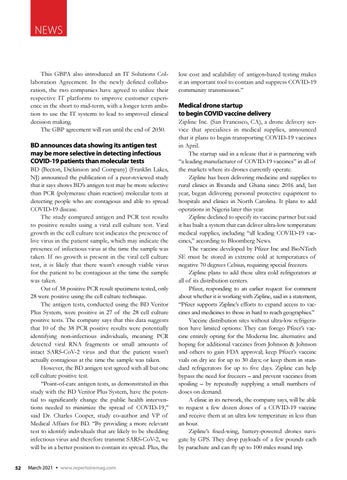NEWS
This GBPA also introduced an IT Solutions Collaboration Agreement. In the newly defined collaboration, the two companies have agreed to utilize their respective IT platforms to improve customer experience in the short to mid-term, with a longer term ambition to use the IT systems to lead to improved clinical decision making. The GBP agreement will run until the end of 2030.
BD announces data showing its antigen test may be more selective in detecting infectious COVID-19 patients than molecular tests BD (Becton, Dickinson and Company) (Franklin Lakes, NJ) announced the publication of a peer-reviewed study that it says shows BD’s antigen test may be more selective than PCR (polymerase chain reaction) molecular tests at detecting people who are contagious and able to spread COVID-19 disease. The study compared antigen and PCR test results to positive results using a viral cell culture test. Viral growth in the cell culture test indicates the presence of live virus in the patient sample, which may indicate the presence of infectious virus at the time the sample was taken. If no growth is present in the viral cell culture test, it is likely that there wasn’t enough viable virus for the patient to be contagious at the time the sample was taken. Out of 38 positive PCR result specimens tested, only 28 were positive using the cell culture technique. The antigen tests, conducted using the BD Veritor Plus System, were positive in 27 of the 28 cell culture positive tests. The company says that this data suggests that 10 of the 38 PCR positive results were potentially identifying non-infectious individuals, meaning PCR detected viral RNA fragments or small amounts of intact SARS-CoV-2 virus and that the patient wasn’t actually contagious at the time the sample was taken. However, the BD antigen test agreed with all but one cell culture positive test. “Point-of-care antigen tests, as demonstrated in this study with the BD Veritor Plus System, have the potential to significantly change the public health interventions needed to minimize the spread of COVID-19,” said Dr. Charles Cooper, study co-author and VP of Medical Affairs for BD. “By providing a more relevant test to identify individuals that are likely to be shedding infectious virus and therefore transmit SARS-CoV-2, we will be in a better position to contain its spread. Plus, the 52
March 2021
•
www.repertoiremag.com
low cost and scalability of antigen-based testing makes it an important tool to contain and suppress COVID-19 community transmission.”
Medical drone startup to begin COVID vaccine delivery Zipline Inc. (San Francisco, CA), a drone delivery service that specializes in medical supplies, announced that it plans to begin transporting COVID-19 vaccines in April. The startup said in a release that it is partnering with “a leading manufacturer of COVID-19 vaccines” in all of the markets where its drones currently operate. Zipline has been delivering medicine and supplies to rural clinics in Rwanda and Ghana since 2016 and, last year, began delivering personal protective equipment to hospitals and clinics in North Carolina. It plans to add operations in Nigeria later this year. Zipline declined to specify its vaccine partner but said it has built a system that can deliver ultra-low temperature medical supplies, including “all leading COVID-19 vaccines,” according to Bloomberg News. The vaccine developed by Pfizer Inc and BioNTech SE must be stored in extreme cold at temperatures of negative 70 degrees Celsius, requiring special freezers. Zipline plans to add these ultra cold refrigerators at all of its distribution centers. Pfizer, responding to an earlier request for comment about whether it is working with Zipline, said in a statement, “Pfizer supports Zipline’s efforts to expand access to vaccines and medicines to those in hard to reach geographies.” Vaccine distribution sites without ultra-low refrigeration have limited options: They can forego Pfizer’s vaccine entirely opting for the Moderna Inc. alternative and hoping for additional vaccines from Johnson & Johnson and others to gain FDA approval; keep Pfizer’s vaccine vials on dry ice for up to 30 days; or keep them in standard refrigerators for up to five days. Zipline can help bypass the need for freezers – and prevent vaccines from spoiling – by repeatedly supplying a small numbers of doses on demand. A clinic in its network, the company says, will be able to request a few dozen doses of a COVID-19 vaccine and receive them at an ultra low temperature in less than an hour. Zipline’s fixed-wing, battery-powered drones navigate by GPS. They drop payloads of a few pounds each by parachute and can fly up to 100 miles round trip.
